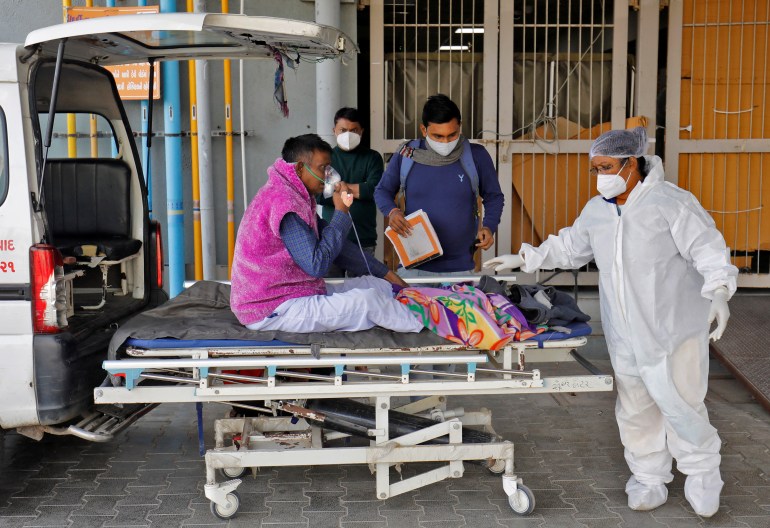India’s Omicron wave may intensify in coming weeks: Experts
Top experts say variant already in community transmission as hospitals see more patients despite a decline in cases in major cities.

India’s COVID-19 infections led by the Omicron variant may see a sharp rise in the coming weeks, some top experts say, noting that the variant is already in community transmission and hospitals are seeing more patients despite a decline in cases in major cities.
India on Monday reported 306,064 new infections over the last 24 hours, the health ministry said, about an 8 percent decline from the average daily cases reported in the last four days. Deaths were 439, the lowest in five days.
Keep reading
list of 4 itemsThousands of Hindus take holy dip in India, defying COVID surge
India’s big cities could see COVID cases peak next week: Experts
India starts COVID booster shots for the vulnerable as cases rise
But weekly positivity rates have risen to 17.03 percent in the week to January 24, from about 0.63 percent on December 27, led by the highly-transmissible Omicron variant.
“Omicron is now in community transmission in India and has become dominant in multiple metros,” a report by the Indian SARS-CoV-2 Genomics Consortium (INSACOG) said on January 10 in a report released on Sunday.

Most cases of the Omicron variant have been mild, the advisory group said, although hospitalisations and cases in intensive care were increasing.
In the last two weeks major cities such as the capital, New Delhi, and financial hub Mumbai in the wealthiest state of Maharashtra, have been reporting big falls in cases after hitting peaks.
That might change, said Dr Subhash Salunke, a member of the state-run Indian Council of Medical Research and the national taskforce on COVID, as the variant is spreading to semi-urban and rural areas.
The western state expects to see multiple peaks in the next eight to 10 weeks, said Salunke, who previously advised the Maharashtra government.
“The number of cases in cities like Mumbai and Pune are the tip of the iceberg,” Salunke told Reuters news agency, adding that the deadly Delta variant from the previous wave was also circulating.
India’s tally of overall infections reached 39.54 million, the second-highest globally behind the United States. The country has seen 489,848 people die of the virus.